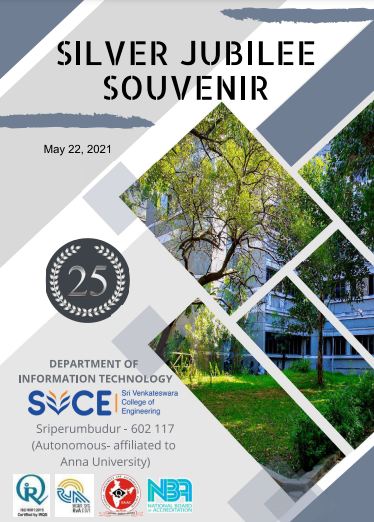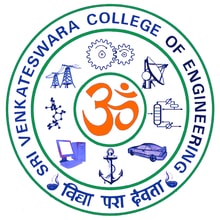In 1996, Sri Venkateswara College of Engineering pioneered the introduction of the B.Tech degree programme in Information Technology under the affiliation of University of Madras. This is the first of its kind in Indian Universities. The department fulfills the requirements for the award of B.Tech Degree of Anna University.
The Venture was initiated under the guidance of our patron Dr.A.C.Muthiah and with the blessings of the Kanchi Paramacharya. When we started, the batch size was 30. This increased to 60 in 1998 and scaled up to 120 by the year 2000. Our growing numbers is indicative of the highly qualified and extremely dedicated teaching faculty of the department who strive for excellence in every sphere of their expertise.
It is the constant endeavor of the department to be in touch with changing needs of the IT Industry so as to be responsive in terms of modifications and introduction of new courses to adapt to these technological changes.
 |
 |
National Board of Accreditation(NBA) for 3 years upto (30-06-2025)
Department Vision
To cultivate an environment that empowers individual students to excel in the field of Information Technology at both national and global levels, by fostering innovative contributions and achievements through the provision of cutting-edge facilities and robust support systems.
Department Mission
1.To create a transformative learning environment that empowers students with cutting-edge technology and resources, promoting active participation in Information Technology education, research, and innovation.
2. To advance the technical and ethical competencies, equipping students with the necessary skills to address the evolving demands of society and contribute effectively to the digital landscape.
3. To harness experiential learning opportunities in Information Technology, preparing students to develop innovative solutions that address engineering and technological challenges on both national and global levels.
|
PROGRAMMES OFFERED
|
|---|
| B.Tech Information Technology(UG Brochure) |
| M.E Computer Science and Engineering (NETWORKS) [Offered till AY 2022-2023] |
| M.Tech Cyber Forensics and Information Security(PG Brochure) |
| Doctor of Philosophy (Ph.D) |
B.Tech Information Technology
|
PROGRAMME EDUCATIONAL OBJECTIVES (PEOs)
|
|---|
| The B.Tech Information Technology programme has the following Programme Educational Objectives(PEOs): 1. Graduates will possess a comprehensive understanding of information technology principles and practices to analyze, design, develop IT solutions, addressing technical challenges across various industries through innovative and collaborative problem-solving. 2. Graduates will demonstrate a dedication to lifelong learning and professional development, equipping themselves with the knowledge and skills necessary to pursue advanced studies and engage in research in the field of information technology. 3. Graduates will apply their technical expertise and analytical skills to create innovative computing systems for real life challenges leading to entrepreneurial ventures. |
|
PROGRAMME OUTCOMES (POs)
|
|---|
| 1. Engineering Knowledge: Engineering Knowledge: Apply the knowledge of mathematics, science, engineering fundamentals and an engineering specialization to the solution of complex engineering problems. 2. Problem Analysis: Identify, formulate, review research literature, and analyze complex engineering problems reaching substantiated conclusions using first principles of mathematics, natural sciences, and engineering sciences. 3. Design / Development of solutions: Design solutions for complex engineering problems and design system components or processes that meet the specified needs with appropriate consideration for the public health and safety, and the cultural, societal, and environmental considerations. 4. Conduct investigations of complex problems: Use research-based knowledge and research methods including design of experiments, analysis and interpretation of data, and synthesis of the information to provide valid conclusions. 5. Modern tool usage: Create, select, and apply appropriate techniques, resources, and modern engineering and IT tools including prediction and modeling to complex engineering activities with an understanding of the limitations. 6. The engineer and society: Apply reasoning informed by the contextual knowledge to assess societal, health, safety, legal and cultural issues and the consequent responsibilities relevant to the professional engineering practice. 7. Environment and sustainability: Understand the impact of the professional engineering solutions in societal and environmental contexts, and demonstrate the knowledge of, and need for sustainable development. 8. Ethics: Apply ethical principles and commit to professional ethics and responsibilities and norms of the engineering practice. 9. Individual and team work: Function effectively as an individual and as a member or leader in diverse teams, and in multidisciplinary settings. 10. Communication: Communicate effectively on complex engineering activities with the engineering community and with society at large, such as, being able to comprehend and write effective reports and design documentation, make effective presentations, and give and receive clear instructions. 11. Project management and finance: Demonstrate knowledge and understanding of the engineering and management principles and apply these to one’s own work, as a member and leader in a team, to manage projects and in multidisciplinary environments. 12. Life-long learning: Recognize the need for, and have the preparation and ability to engage in independent and life-long learning in the broadest context of technological change. |
|
PROGRAMME SPECIFIC OUTCOMES (PSOs)
|
|---|
| The B.Tech Information technology programme demonstrates the following two Programme Specific Outcomes (PSOs): 1. Apply domain expertise and programming skills to analyze problems and develop computational systems that address real world challenges. 2. Explore the state of the art technologies to meet the evolving demands of Information Technology industry and societal applications.
|
M.E Computer Science and Engineering (Networks)
|
PROGRAMME EDUCATIONAL OBJECTIVES (PEOs)
|
|---|
| The M.E Computer Science and Engineering (Networks) programme has the following Programme Educational Objectives(PEOs): 1. Evolve as globally competent networking professionals, researchers and entrepreneurs possessing 21st century skills, for developing innovative solutions to design, maintain, and manage network infrastructure and its application. 2. Gain expertise in the use of modern tools and techniques for developing computer network systems understanding the importance of social, business, technical, environmental, and human context in which the systems would work |
|
PROGRAMME OUTCOMES (POs)
|
|---|
| The M.E Computer Science and Engineering (Networks) programme demonstrates the following Programme Outcomes (POs): PO1. An ability to independently carry out research /investigation and development work to solve practical problems. PO2. An ability to write and present a substantial technical report/document. PO3. Students should be able to demonstrate a degree of mastery over the area as per the specialization of the program. The mastery should be at a level higher than the requirements in the appropriate bachelor program |
M.Tech Cyber Forensics and Information Security
|
PROGRAMME EDUCATIONAL OBJECTIVES (PEOs)
|
|---|
| The M.Tech Cyber Forensics and Information Security programme has the following Programme Educational Objectives(PEOs): 1. Evolve as globally competent cyber security professionals, researchers and entrepreneurs possessing 21st century skills, to define the architecture, design, and management of the security of an organization 2. Possess in-depth knowledge and skill sets in Cyber Security to monitor, prepare, predict, detect respond and prevent cyber-attacks and ensure enterprise security. |
|
PROGRAMME OUTCOMES (POs)
|
|---|
| The M.Tech Cyber Forensics and Information Security programme demonstrates the following Programme Outcomes (POs): PO1. An ability to independently carry out research /investigation and development work to solve practical problems. PO2. An ability to write and present a substantial technical report/document. PO3. Students should be able to demonstrate a degree of mastery over the area as per the specialization of the program. The mastery should be at a level higher than the requirements in the appropriate bachelor program |



